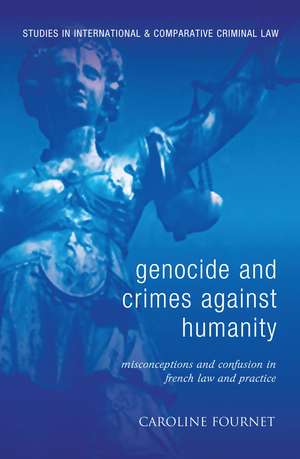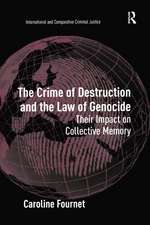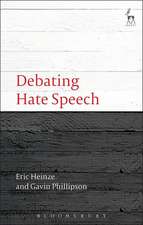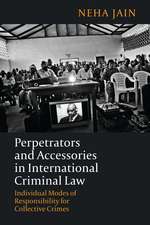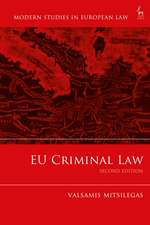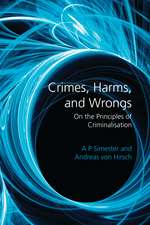Genocide and Crimes Against Humanity: Misconceptions and Confusion in French Law and Practice: Studies in International and Comparative Criminal Law
Autor Caroline Fourneten Limba Engleză Hardback – 30 ian 2013
Din seria Studies in International and Comparative Criminal Law
- 30%
 Preț: 897.55 lei
Preț: 897.55 lei - 21%
 Preț: 275.26 lei
Preț: 275.26 lei - 18%
 Preț: 358.30 lei
Preț: 358.30 lei - 30%
 Preț: 540.65 lei
Preț: 540.65 lei - 27%
 Preț: 345.42 lei
Preț: 345.42 lei - 27%
 Preț: 442.83 lei
Preț: 442.83 lei - 27%
 Preț: 501.70 lei
Preț: 501.70 lei - 14%
 Preț: 603.73 lei
Preț: 603.73 lei - 14%
 Preț: 509.52 lei
Preț: 509.52 lei - 24%
 Preț: 374.34 lei
Preț: 374.34 lei - 11%
 Preț: 374.34 lei
Preț: 374.34 lei - 30%
 Preț: 779.33 lei
Preț: 779.33 lei - 30%
 Preț: 774.62 lei
Preț: 774.62 lei - 30%
 Preț: 893.89 lei
Preț: 893.89 lei - 24%
 Preț: 190.33 lei
Preț: 190.33 lei - 30%
 Preț: 570.02 lei
Preț: 570.02 lei - 18%
 Preț: 302.99 lei
Preț: 302.99 lei - 18%
 Preț: 297.86 lei
Preț: 297.86 lei - 18%
 Preț: 319.86 lei
Preț: 319.86 lei - 30%
 Preț: 603.81 lei
Preț: 603.81 lei - 30%
 Preț: 718.27 lei
Preț: 718.27 lei
Preț: 465.96 lei
Preț vechi: 645.41 lei
-28% Nou
Puncte Express: 699
Preț estimativ în valută:
89.16€ • 93.34$ • 73.78£
89.16€ • 93.34$ • 73.78£
Carte disponibilă
Livrare economică 17-31 martie
Preluare comenzi: 021 569.72.76
Specificații
ISBN-13: 9781849463348
ISBN-10: 1849463344
Pagini: 168
Ilustrații: black & white illustrations
Dimensiuni: 156 x 234 x 10 mm
Greutate: 0.41 kg
Ediția:New.
Editura: Bloomsbury Publishing
Colecția Hart Publishing
Seria Studies in International and Comparative Criminal Law
Locul publicării:London, United Kingdom
ISBN-10: 1849463344
Pagini: 168
Ilustrații: black & white illustrations
Dimensiuni: 156 x 234 x 10 mm
Greutate: 0.41 kg
Ediția:New.
Editura: Bloomsbury Publishing
Colecția Hart Publishing
Seria Studies in International and Comparative Criminal Law
Locul publicării:London, United Kingdom
Caracteristici
The crime of genocide has remained absent from French courtrooms and this book dissects the reasons for this absence, reviewing and analysing the potential legal obstacles to the judicial use of the law of genocide.The author argues that the French misunderstandings of the crime of genocide might ultimately be symptomatic of a more widespread misconception of the crime of genocide.A fascinating study for anyone interested in the crime of genocide and international criminal law more generally.
Notă biografică
Caroline Fournet is Associate Professor and Rosalind Franklin Fellow at the Department of Criminal Law and Criminology at the University of Groningen .
Cuprins
Introduction Part 1 Crimes Against Humanity: From Nuremberg to Lyon . . . And Back Again 1 Trying Klaus Barbie: Setting a Precedent? 1.1 Crimes Against Humanity and the Victimisation of the Individual 1.2 Systematic Crimes 'in the Name of a State Practising a Policy of Ideological Supremacy' 1.3 Perceiving the Knowledge Requirement 2 Trying Paul Touvier and Maurice Papon: Twisting the Precedent 3 A Problematic Legacy 3.1 Equalising Victims, Confusing Crimes 3.2 Making of Nuremberg a Law of Circumstances Part 2 Punishing Genocide: Too Much To Ask? 4 The Direct Applicability of the Genocide Convention under French Law 5 The Non-Applicability of Statutory Limitations to the Crime of Genocide 6 The Applicability of Retroactive Criminal Norms 7 The Contemporary Understanding of the Law of Genocide by the French Judiciary: Dualism in Disguise? 8 Concluding Observations Part 3 Why Genocide? 9 Responding to the Incorrect Ill-Qualification of Vichy France in the Touvier and Papon cases 9.1 The Laws of Vichy France: 'An Impeccable Style for an Infinite Horror' 9.2 The Criminal Acts of Vichy France: The Question of Genocidal Intent 9.3 The Criminality of Vichy France: Complicity in Genocide 10 Responding to the Equalisation of Victims in the Barbie Case 11 Genocide: A Crime Against the Family? 11.1 The Legal Destruction of the Family 11.2 The Physical Destruction of the Family 12 Conclusion
Recenzii
It is a work which will be of central interest to those working in the specialised field of international criminal law but it undoubtedly has value for those working in the fields of transitional justice and legal systems and methods and is a thoughtful contribution to the academy.
Descriere
This book explores the ambiguities of the French law of genocide by exposing the inexplicable dichotomy between a progressive theory and a disinclined practice. Observing that the crime of genocide has remained absent from French courtrooms to the benefit of crimes against humanity, this research dissects the reasons for this absence.
